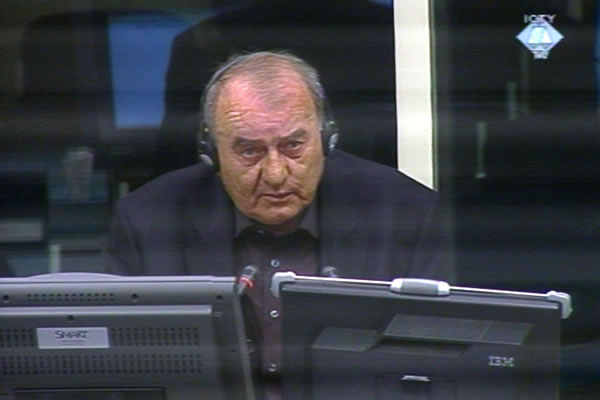Home
ARMY WAS RESPONSIBLE FOR KINDERGARTEN AND POLICE
General Slavko Lisica testifies at the trial of Mico Stanisic and Stojan Zupljanin as one of the witnesses called by the Trial Chamber. Lisica contends that military commanders were responsible for everything, from kindergartens and schools to businesses and the police. The prosecutor claims that Lisica may have wanted it to be so, but the reality was different
 Slavko Lisica, witness at the Stanisic and Zupljanin trial
Slavko Lisica, witness at the Stanisic and Zupljanin trial Former commander of the Tactical Group 3 in the VRS 1st Krajina Corps Slavko Lisica began his evidence today as one of the witnesses called by the Trial Chamber at the trial of former Bosnian Serb police leaders Mico Stanisic and Stojan Zupljanin. The former interior minister and the police chief in the Banja Luka region are on trial for crimes against Croats and Muslims in BH from April to late December 1992.
Some witnesses who have testified at this trial mentioned Lisica when they spoke about the subordination of the police to the army in combat operations. The prosecution alleges that the police was obliged to investigate and punish any crimes committed in combat by the police. The defense contends that military courts were responsible to try those responsible for the crimes committed in combat by the police, rather than the civilian judiciary.
In his reply to Judge Hall, Lisica said that ‘the police, the residents, the kindergartens, schools, the economic resources and businesses’ in his area of responsibility were under the ‘military command’. When it was necessary, Lisica always tried to accommodate the views of the chief of the Doboj Security Services Center Andrija Bjelosevic. However, the general always had the last word.
The judge then showed Lisica a document in which Bjelosevic demanded that the police withdraw from the battlefield because of the security situation in Doboj. When the prosecution expert Ewan Brown testified at this trial, the defense noted that General Lisica purportedly said he ‘understands the proposal but will not allow the police to withdraw’. As the defense argued, this proved that the police was subordinated to the army. Brown noted that Lisica didn’t issue an order prohibiting the withdrawal but merely only ‘expressed his opinion that the police shouldn’t withdraw’. Commenting on Bjelosevic’s demand, Lisica today said that the request was ‘human’, adding that many people asked him to allow them to leave the front because they ‘were afraid of war and death’. Lisica agreed with the judges’ interpretation of the document that there would have been less crime in Doboj if professional police officers had remained in the town and prevented the looting and unrest.
Lisica also claimed that the military courts had de iure jurisdiction to prosecute those who committed crimes. In 1992, however, there were no ‘military courts, there was no state and no morality’ and the military commanders ended up with that jurisdiction. Lisica added that he didn’t want to defend anyone, not even the police, but simply to say that he ‘as a commander was responsible for everything’.
General Lisica continues his evidence tomorrow.
Linked Reports
- Case : Zupljanin i Stanisic - "Bosnia and Herzegovina"
- 2011-10-17 ZUPLJANIN’S REACTION TO OMARSKA AND KERATERM
- 2011-10-14 WHITEWASHING KERATERM PRISON CAMP
- 2011-10-07 COLOR OF PAPER AS PROOF OF ‘MUSLIM DOMINATION’
- 2012-03-02 LIMITED RESPONSIBILITY OF THE ARMY
- 2012-03-09 PARTIES RESTED THEIR CASES AT THE TRIAL OF RS POLICE OFFICIALS
- 2012-03-28 ZUPLJANIN SEEKS TO TENDER NEW EVIDENCE
